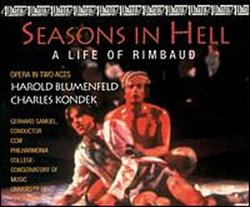| All Artists: Randall Gremillion, Harold Blumenfeld, Gerhard Samuel Title: Blumenfeld: Seasons in Hell Members Wishing: 0 Total Copies: 0 Label: Albany Records Release Date: 10/14/1997 Genre: Classical Style: Opera & Classical Vocal Number of Discs: 2 SwapaCD Credits: 2 UPC: 034061026228 |
Search - Randall Gremillion, Harold Blumenfeld, Gerhard Samuel :: Blumenfeld: Seasons in Hell
 | Randall Gremillion, Harold Blumenfeld, Gerhard Samuel Blumenfeld: Seasons in Hell Genre: Classical |
Larger Image |
CD Details |
CD ReviewsOutstanding Contemporary Opera Jeffrey G Kurtzman | St. Louis, Missouri | 03/26/2000 (5 out of 5 stars) "Blumenfeld's "Seasons in Hell" is a very sophisticated, intense opera, but nevertheless manages to appeal on a visceral, sensual level through its obvious lyricism and carefully wrought dramatic construction. Kondek's libretto consists mostly of paraphrases and quotations from the poetry, prose, diaries and letters of Rimbaud and Paul Verlaine. Consequently, the language is on a literary level hardly ever encountered in opera. Blumenfeld does a brilliant job of bringing the language through to the listener by means of a flexible melodic line that is always focused on clarity of diction and the dramatic impact of what is being said. I am reminded of the remarkable attention to clarity of language in the operas of Monteverdi and Britten. Still, the work is obviously a singer's opera--difficult to sing, but immensely rewarding for the voice and immediately comprehensible and lyrical for the audience. The dramatic plot is itself unique and unfolds in a complex, yet dramatically effective manner. Rimbaud's life is divided into two quite distinct phases by a pivotal point when the prodigy renounces the hothouse of literature altogether and goes to Africa as a worldly adventurer. The plot traces Rimbaud's life alternately (and sometimes simultaneously) in two reverse directions: from his early death in Abyssinia backward, and from his French childhood forward, with the two chronologies meeting at the end of the opera at the pivotal point in Rimbaud's career. Thus the two Rimbaud's represent two somewhat different musical styles, and the roles of the two Rimbaud's are sung by two different baritones, overlaid by a soprano electronically enhanced and modified representing Rimbaud's poetic muse. The opera closes with a duet between the two Rimbaud's, each standing immediately before or after the decisive moment. This forms a very effective denouement, giving a convincing sense of closure and balancing the large ensemble finale featuring the homosexual relationship between Rimbaud and Verlaine that brings the first act to a rousing and explosive conclusion. The homosexual extravagances of the young Rimbaud are also counterbalanced in the opera by the touching love between the older Rimbaud and an Abyssinian woman--Rimbaud's renunciation of literature had also led to the renunciation of his "artist's" life of debauchery and homosexuality. This is one of the most sophisticated operas I have ever heard, on a par in complexity and subtlety with some of the best works from the entire history of opera. Blumenfeld has created a masterful piece not only through the lyricism mentioned above, but also by a varied and clever orchestral accompaniment that manages both subtly and overtly to support the dramatic progress of the work without ever interfering with the voices. Blumenfeld's compositional technique in balancing orchestra and voices is uncanny, and the dialogue and narrative are scarcely ever lost during the entire performance. Despite the obvious complexity and performance difficulty of the work, there are also moments of transparent simplicity, both vocally and instrumentally. Describing a piece of music, especially one as refined as this, is well-nigh impossible. It is much easier to compare it with other new American works, and in this regard, Blumenfeld's "Seasons in Hell" stands far above anything else I have seen, and in my view even surpasses John Corigliano's "Ghosts of Versailles," which I have heard on audio tape (with score in hand) and seen on television. Blumenfeld's opera, for all its sophistication and subtlety, is more emotionally direct and coherent than Corigliano's, and Blumenfeld's musical conception is more dramatically successful."
|
